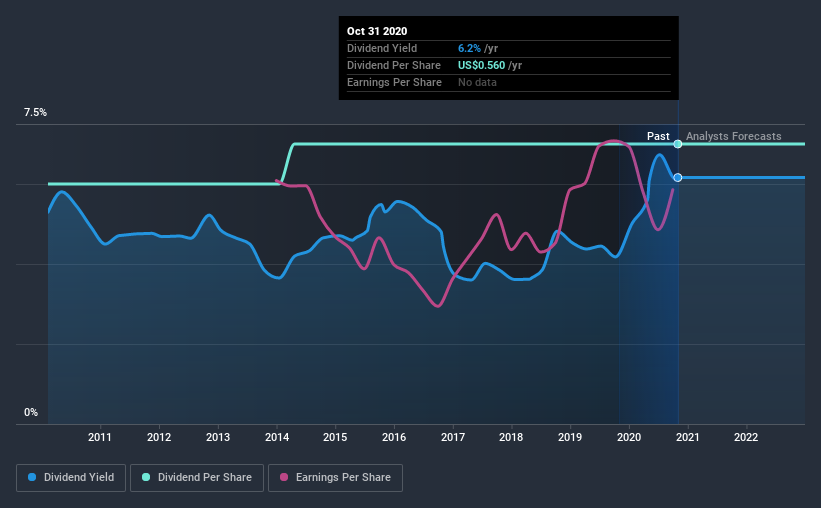Just Four Days Till BCB Bancorp, Inc. (NASDAQ:BCBP) Will Be Trading Ex-Dividend

BCB Bancorp, Inc. (NASDAQ:BCBP) stock is about to trade ex-dividend in four days. Ex-dividend means that investors that purchase the stock on or after the 5th of November will not receive this dividend, which will be paid on the 20th of November.
BCB Bancorp's next dividend payment will be US$0.14 per share, and in the last 12 months, the company paid a total of US$0.56 per share. Based on the last year's worth of payments, BCB Bancorp stock has a trailing yield of around 6.2% on the current share price of $9.09. If you buy this business for its dividend, you should have an idea of whether BCB Bancorp's dividend is reliable and sustainable. That's why we should always check whether the dividend payments appear sustainable, and if the company is growing.
View our latest analysis for BCB Bancorp
Dividends are typically paid out of company income, so if a company pays out more than it earned, its dividend is usually at a higher risk of being cut. BCB Bancorp is paying out an acceptable 55% of its profit, a common payout level among most companies.
When a company paid out less in dividends than it earned in profit, this generally suggests its dividend is affordable. The lower the % of its profit that it pays out, the greater the margin of safety for the dividend if the business enters a downturn.
Click here to see the company's payout ratio, plus analyst estimates of its future dividends.
Have Earnings And Dividends Been Growing?
Companies with consistently growing earnings per share generally make the best dividend stocks, as they usually find it easier to grow dividends per share. Investors love dividends, so if earnings fall and the dividend is reduced, expect a stock to be sold off heavily at the same time. This is why it's a relief to see BCB Bancorp earnings per share are up 4.6% per annum over the last five years.
We'd also point out that BCB Bancorp issued a meaningful number of new shares in the past year. It's hard to grow dividends per share when a company keeps creating new shares.
The main way most investors will assess a company's dividend prospects is by checking the historical rate of dividend growth. Since the start of our data, 10 years ago, BCB Bancorp has lifted its dividend by approximately 1.6% a year on average.
To Sum It Up
Has BCB Bancorp got what it takes to maintain its dividend payments? BCB Bancorp has been generating some growth in earnings per share while paying out more than half of its earnings to shareholders in the form of dividends. In sum this is a middling combination, and we find it hard to get excited about the company from a dividend perspective.
However if you're still interested in BCB Bancorp as a potential investment, you should definitely consider some of the risks involved with BCB Bancorp. For instance, we've identified 2 warning signs for BCB Bancorp (1 is a bit unpleasant) you should be aware of.
If you're in the market for dividend stocks, we recommend checking our list of top dividend stocks with a greater than 2% yield and an upcoming dividend.
This article by Simply Wall St is general in nature. It does not constitute a recommendation to buy or sell any stock, and does not take account of your objectives, or your financial situation. We aim to bring you long-term focused analysis driven by fundamental data. Note that our analysis may not factor in the latest price-sensitive company announcements or qualitative material. Simply Wall St has no position in any stocks mentioned.
Have feedback on this article? Concerned about the content? Get in touch with us directly. Alternatively, email editorial-team@simplywallst.com.

 Yahoo Finance
Yahoo Finance 
